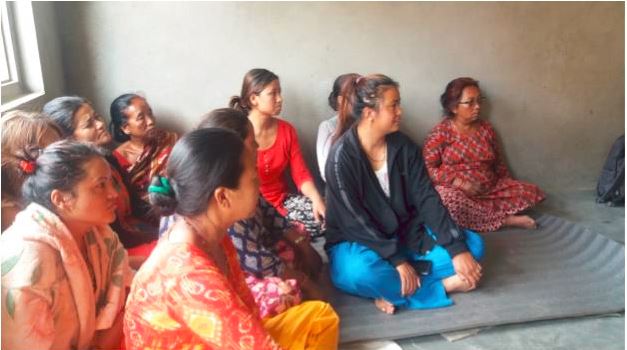According to the “Demographic and Health survey” of 2011, one-third of the Nepali married women age 15-49 have experienced physical, emotional or sexual violence from their spouse. Knowing that domestic violence is still a big issues in Nepali society, the volunteers of VIN’s women empowerment program decided to raise an awareness campaign in Kavresthali.
The 24th and 25th of April, they did two lessons in Kavresthali to aware the women about domestic violence. Twenty women attended these lesson. Through this campaign, VIN’s team wanted to make the women understand all the different types of violence (physical, sexual, financial, mental…), to aware them about the cycle of violence, to teach them the Nepali’s law about domestic violence and to provide them with enough information if they need help.
“First of all, we needed to create a safe space where the women can feel comfortable to speak about their experiences and where they can be able to hear a new point of view about the topic. In that way, we started with a speech about respect, non-judgment and open-mindedness. Then, we asked the women to make a commitment.
To open the discussion and evaluate the level of knowledge of the women about domestic violence, we asked them what is violence ?? according to them. Their answers were: “Torture”, “Elder discrimination”, “Social discrimination”, “Beating”, “Blaming”, “Bad words”, “Fighting”, “Gender discrimination”, “Bad thinking”, “Wife dominated”, ”Forced work”, “Lack of education”, “Caste discrimination”, “Economic issues”, “Dowry system”, “sexual problems” and “Health discrimination”. We explained in details all the different types of acts that are considered as violent. We spoke about physical abuse, emotional violence, economic issues, sexual abuse, threats, using male’s privileges, intimidation and isolation. We aware the women that any of the acts we spoke about were considered as violent acts, and that they should never let someone doing that kind of acts to them.
At the end of the lesson, we explained the Nepali’s law about domestic violence and the things they can do if they – or one of their friends – have domestic violence issues. Finally, we gave them some numbers that they can call if they have any issues. (VIN’s number, SAATHI’s number, Women’s commission’s number and police’s number).
The women looked satisfied about the lessons. We asked them if the lesson was useful and interesting and all of them answered “Yes”. We also asked them if they learned something new during the lesson and they all also answered “Yes”


